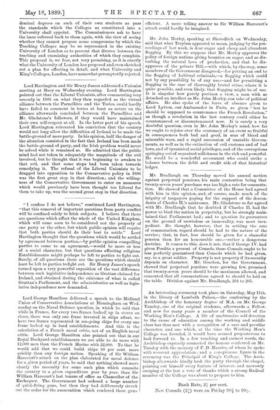Mr. John Morley, speaking at Shoreditch on Wednesday, said that
what Toryism appeared to mean, judging by the pro- ceedings of last week, is dear sugar and cheap and abundant flogging. By this we suppose that Mr. Morley approves the policy of foreign nations giving bounties on sugar, and so dis- turbing the natural laws of production, and that he dis- approves of the private Bill,—with which, by-the-way, some members of the Government disagreed,—for putting an end to the flogging of habitual criminals,—a flogging which could not by any possibility be of any use,—and for permitting a flogging in the case of thoroughly brutal crime, where it is quite possible, and even likely, that flogging might be of use. It is singular how purely partisan a view, a man with so detached an intellect as Mr. John Morley, can take of political affairs. He also spoke of the leave of absence given to Lord Lytton, our Ambassador in Paris, as given "lest he should be supposed to countenance the French Revolution," as though a revolution in the last century could either be countenanced or discountenanced now. It is surely a very doubtful question, even in Mr. John Morley's mind, how far we ought to rejoice over the centenary of an event so fruitful in consequences both bad and good, in seas of blood and miserable wars, and a rapid succession of unstable Govern- ments, as well as in the extinction of evil customs and of bad laws, and of tyrannical social privileges, and of the corruptions springing out of organised selfishness in the rich and powerful. He would be a wonderful accountant who could strike a balance between the debit and credit side of that historical ledger.


































 Previous page
Previous page